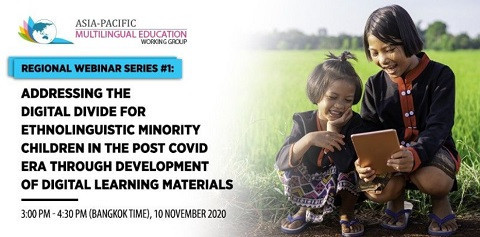
GCED Basic Search Form
Quick Search
当前位置
Events

The COVID-19 pandemic has had a profound impact on education around the world with over 90% of students affected at the height of school closures. Countries have adapted through various distance learning strategies, ranging from online platforms to television and radio programming. Yet many learners struggle to access distance learning due to lack of internet connectivity, reliable devices, and electricity.
For learners from minority language communities, distance learning can be further complicated by language issues. Less than 30% of low- and middle- income countries have designed learning materials for speakers of minority languages. At the same time, the disruption to education and economic impact of the pandemic means that an estimated 5.9 million students in the Asia-Pacific region are at risk of not returning to school.
Ethnolinguistic minorities and other disadvantaged groups are at a special risk for not returning to school as the pandemic adds to existing barriers to schooling. These obstacles include not only language, but also broader inequalities faced by ethnolinguistic minorities such as marginalization, poverty, and isolation due to remoteness.
Overall, these students are more likely to have experienced a disruption in their schooling as distance learning programs do not reach them, and are more likely to face significant barriers in returning to school.
The challenges faced by ethnolinguistic minority students during the COVID-19 era are not new. Despite research showing the positive impact of mother tongue-based multilingual education (MTB MLE) in ensuring learners from non-dominant language groups acquire strong foundational skills in literacy and numeracy, as much as 40% of the global population does not have access to an education in a language they speak or understand. School becomes difficult and frustrating for these children, leading to lower enrollment rates and a lower quality of learning for children from minority language communities.
Against this backdrop, the Asia-Pacific Multilingual Education Working Group (MLE WG) has been working to promote MTB MLE to address educational disparities between linguistic communities, to help achieve inclusive and quality education for all. As part of these efforts, MLE WG organized the Inclusion, Mobility and Multilingual Education Conference5 and 3rd High-level Policy Forum to address issues of language, human mobility, multilingual education, and development. The high-level policy forum resulted in the Bangkok Statement on Language and Inclusion, which represents a key development in governmental commitment in the region to including languages spoken by ethnolinguistic minority communities in the formal and informal sectors.
In response to COVID-19, the MLE WG conducted an online survey to assess the effects of COVID-19 on distance learning for ethnolinguistic minority children, which identified several challenges ethnolinguistic minority children’s learning. Responding to these identified challenges, the working group is organizing a series of regional webinars for national and regional stakeholders to foster policies and practices that support the continuation of teaching and learning for ethnolinguistic minority children.
The first of this webinar series will explore different digital solutions to improve access to mother tongue learning materials. The webinar will provide an opportunity to exchange experiences and practices on the creation and distribution of digital learning materials. It will address the immediate challenges caused by the pandemic within the context of the continuing effort to build education systems that provide inclusive quality education for all.
Objectives
1. To raise awareness of the importance and necessity of MTB MLE.
2. To share strategies on how to develop and distribute digital materials that meet government standards and support ethnolinguistic minority children’s learning.
3. To catalyze multilateral engagement and cooperation in implementing MTB MLE programmes in the region
Target Audience
The target audience for the webinar will be regional and national level education stakeholders (including both policymakers and implementers) related to/interested in advancing mother tongue-based multilingual education programmes through digital learning platforms.
Working Language
English will be the working language of the webinar
Date and Format
10 November 2020
Time: 3pm – 4:30pm (Bangkok time)
Format: Zoom
Registration
Registration is free and required in advance. Once you register, a unique join URL will be sent to your email.
Registration link: https://unesco-org.zoom.us/webinar/register/WN_jS4ltGxVRlSv8kZTp0gOBw
Resources
The Bangkok Statement on Language and Inclusion
The Asia-Pacific Multilingual Education Working Group (MLE WG)
The Inclusion, Mobility and Multilingual Education Conference
Global Education Monitoring Report 2020
UNESCO COVID-19 education response: how many students are at risk of not returning to school?
Global Education Monitoring Policy Paper: If you don't understand, how can you learn?
For more Information
Asia Pacific Multilingual Education Working Group Secretariat
E-mail: ap.mlewg@gmail.com
URL:
